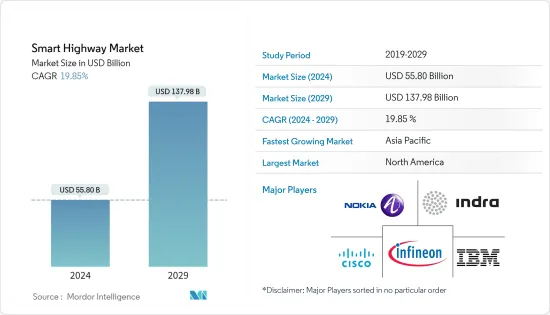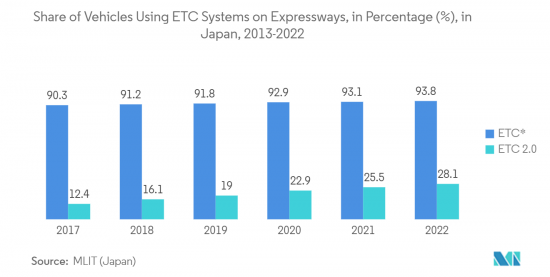PUBLISHER: Mordor Intelligence | PRODUCT CODE: 1402996

PUBLISHER: Mordor Intelligence | PRODUCT CODE: 1402996
Smart Highway - Market Share Analysis, Industry Trends & Statistics, Growth Forecasts 2024 - 2029

The Smart Highway Market size is estimated at USD 55.80 billion in 2024, and is expected to reach USD 137.98 billion by 2029, growing at a CAGR of 19.85% during the forecast period (2024-2029).
The growing investment in smart cities, along with benefits associated with smart technologies, such as traffic safety improvement and data-driven traffic control to reduce infrastructure damage, drives the growth of the smart highway market.
Key Highlights
- With rapid urbanization, an increase in greenhouse gas (GHG) emissions contributes to an expanding carbon footprint and forcing the adoption of clean and sustainable technology for intelligent transportation. For instance, according to the United States Environmental Protection Agency, Greenhouse gas (GHG) emissions from transportation account for about 28 percent of total United States greenhouse gas emissions.
- Smart transport management systems use digital sensors that can acquire and record data in a landslide, poor weather conditions, and traffic congestions. They can display forecasts and alerts on LED screens across the states and national highways.
- The market is driven by many factors, such as reducing the number of accidents occurring on highways, providing safe and efficient transportation systems, and reducing the transportation time on highways connecting the major cities of a country. All of these can be done by implementing smart technologies, which efficiently monitor traffic and help properly functioning highways while providing real-time information to the authorities.
- The Lack of infrastructural support in developing countries can significantly restrain the smart highway market. Implementing smart highways necessitates substantial investment in technology, sensors, communication networks, and a skilled workforce. Developing countries often face budget constraints, and governments may prioritize other essential sectors over advanced transportation infrastructure.
- The outbreak of COVID-19 significantly impacted the construction process of highway projects, particularly after the initial outbreak, due to supply chain disruptions as a result of lockdown-induced transportation restrictions. Additionally, the consequent reduction in traffic also impacted toll collection and other revenue streams from the highways. However, the pandemic also attracted attention to the benefits of smart technologies on highways, which is expected to support the growth of the studied market during the forecast period.
Smart Highway Market Trends
Smart Transport Management Systems Product Technology is Expected to Hold Significant Market Share
- Smart Transport management systems (STMS) play a vital role in the smart highway market, as they are a key technology that enables the integration of advanced transportation solutions to improve efficiency, safety, and sustainability. SMTS encompasses a range of products and technologies that facilitate real-time monitoring, control, and management of various elements within the transportation system.
- ITMS includes a network of sensors, cameras, and a traffic control system that monitors real-time traffic conditions. These systems collect traffic flow, density, and congestion data, enabling traffic operators to optimize traffic signal timing, manage lane control, and respond to incidents efficiently.
- ETC systems are an essential part of smart highways. They use various technologies like RFID, ANPR, DSRC, or GNSS to automate toll collection, reducing congestion and improving traffic flow at toll plazas. According to MLIT (Japan), As of the end of March 2022, the share of vehicles on Japanese expressways using ETC systems amounted to around 93.8 percent. Improved ETC 2.0 systems were installed in 28.1 percent of surveyed vehicles. Electronic Toll Collection systems serve to charge expressway users while bidirectionally communicating data via the cloud between the vehicle and the road infrastructure to improve traffic.
- Traffic Information and Navigation Systems (TINS) provide real-time traffic information to drive through variable message signs, mobile apps, or navigation devices. This helps drivers make informed decisions, avoid congested routes, and improve traffic distribution.
- Environmental Monitoring systems monitor air quality and other environmental parameters along highways to assess pollution levels and make data-driven decisions to reduce emissions and improve air quality.

North America is Expected to Hold Significant Market Share
- The North America Smart highway market was experiencing steady growth and advancements in intelligent transportation systems (ITS) and smart infrastructure. Government agencies in North America have been actively promoting adopting smart transportation solutions to address traffic congestion, reduce accidents, and enhance overall transportation efficiency.
- The region's strong technological infrastructure and high smartphone penetration have facilitated the implementation of ITS technologies, such as electronic toll collection systems, traffic management systems, and real-time traffic information.
- There has been a significant emphasis on deploying smart highway technologies to enhance road safety through incident detection, management systems, and vehicle-to-infrastructure communication.
- The region has seen increasing interest in autonomous and connected vehicle technologies, which have the potential to revolutionize the transportation landscape and require smart highway infrastructure to support their deployment.
- North America is a global technological leader. Coupled with this strength, the increased spending on construction and road infrastructure will offer more opportunities for the region to expand. Also, the public construction spending on highway and street projects in the United States is very high. For instance, In October 2022, the United States Department of Transportation's Federal Highway Administration (FHWA) announced that it had released USD 59.9 billion in Fiscal Year 2023 apportionments for 12 formula programs to support investment in critical infrastructure, including roads, bridges, and tunnels, carbon emission reduction, and safety improvements utilizing funding from President Biden's Bipartisan Infrastructure Law.
Smart Highway Industry Overview
The smart highway market is highly fragmented, with the presence of major players like Alcatel-Lucent Enterprise (Nokia Corporation), Cisco Systems Inc., IBM Corporation, Indra Sistemas SA, and Infineon Technologies AG. Players in the market are adopting strategies such as partnerships and acquisitions to enhance their product offerings and gain sustainable competitive advantage.
In January 2023, Huawei's Seaport Corps formed a joint innovation body with Tianjin Port Group and other partners to overcome the challenges faced by the "smart green" port field. It aims to provide a "China solution" for constructing smart green ports worldwide. Huawei was good at providing information and communications technology (ICT) products and solutions. The company mainly contributed its 5G and cloud technology, road sensors, and mobile data center (MDC) for driverless cars to the smart port in Tianjin.
In June 2022 - Siemens AG acquired Brightly; the acquisition offers Siemens in center position to address the fast-growing software market for buildings and built infrastructure. With Brightly's innovative software solutions, Siemens aims to offer comprehensive and advanced tools that optimize building performance, energy efficiency, and occupant comfort.
Additional Benefits:
- The market estimate (ME) sheet in Excel format
- 3 months of analyst support
TABLE OF CONTENTS
1 INTRODUCTION
- 1.1 Study Assumptions and Market Definition
- 1.2 Scope of the Study
2 RESEARCH METHODOLOGY
3 EXECUTIVE SUMMARY
4 MARKET INSIGHTS
- 4.1 Market Overview
- 4.2 Industry Attractiveness - Porter's Five Forces Analysis
- 4.2.1 Threat of New Entrants
- 4.2.2 Bargaining Power of Buyers
- 4.2.3 Bargaining Power of Suppliers
- 4.2.4 Threat of Substitutes
- 4.2.5 Intensity of Competitive Rivalry
- 4.3 Industry Stakeholder Analysis
- 4.4 Assessment of the Impact of COVID-19 on the Industry
5 MARKET DYNAMICS
- 5.1 Market Drivers
- 5.1.1 Increasing Highway and Infrastructure Projects
- 5.1.2 Rising Need for Safe and Efficient Transportation
- 5.2 Market Challenges
- 5.2.1 Capital-intensive Projects
- 5.2.2 Lack of Infrastructural Support in Developing Countries
- 5.3 Market Opportunities
- 5.4 Key Recent Case Studies
- 5.5 Evolution of Smart Highway Technology
6 MARKET SEGMENTATION
- 6.1 By Product Technology
- 6.1.1 Smart Traffic Management Systems
- 6.1.2 Smart Transport Management Systems
- 6.1.3 Monitoring Systems
- 6.1.4 Services
- 6.2 By Geography
- 6.2.1 North America
- 6.2.2 Europe
- 6.2.3 Asia Pacific
- 6.2.4 Latin America
- 6.2.5 Middle East and Africa
7 COMPETITIVE LANDSCAPE
- 7.1 Company Profiles
- 7.1.1 Alcatel-Lucent Enterprise (Nokia Corporation)
- 7.1.2 Cisco Systems Inc.
- 7.1.3 IBM Corporation
- 7.1.4 Indra Sistemas SA
- 7.1.5 Infineon Technologies AG
- 7.1.6 Huawei Technlogies Co. Ltd.
- 7.1.7 Kapsch AG
- 7.1.8 LG CNS Co. Ltd (LG Electronics Inc.)
- 7.1.9 Schneider Electric SE
- 7.1.10 Siemens AG
- 7.1.11 Xerox Corporation
8 INVESTMENT ANALYSIS
9 MARKET OPPORTUNITIES AND FUTURE TRENDS




